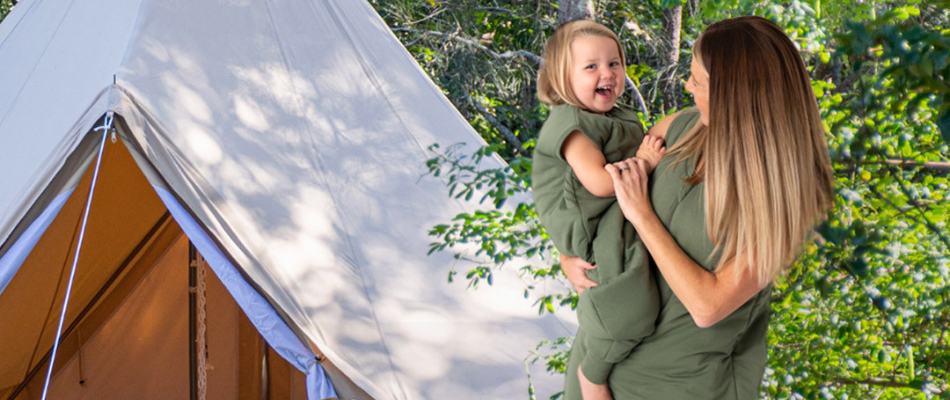Choose the Right Campsite:
When camping with young children, selecting the right campsite is essential. Look for family-friendly campsites that offer amenities such as baby changing facilities, clean bathrooms, and proximity to child-friendly activities. Research the site beforehand to ensure it's suitable for your needs and offers a safe environment for your little ones to explore.
Practice Camping at Home:
Before embarking on your camping trip, consider practicing at home. Set up a tent in the backyard or even indoors, and spend a night with your baby or toddler to familiarise them with the camping experience. This can help them feel more comfortable sleeping in a tent and reduce any anxiety they may have.
Pack Strategically:
When it comes to packing, be mindful of the essentials while keeping it lightweight and manageable. Consider the following items:
a. Clothing: Pack extra layers and weather-appropriate clothing. Remember, temperatures can drop during the night, so bring warm sleepwear for your little one.
b. Bedding: Bring a comfortable and familiar sleeping environment for your baby or toddler, such as a travel cot and a baby sleeping bag. A 3.5 Tog baby sleeping bag is great for night time, when the temperature drops. These baby sleeping bags are warmly padded and suitable in temperatures below 18 degrees. keeping little one at a constant temperature. During the day or on warmer nights, you can use a Summer baby sleeping bag. Find out which Tog is suitable for your camping trip in our Tog Guide. If you have a toddler, a Slumbersac sleeping bag with feet could be ideal as these toddler sleeping bags have legs with foldable feet covers so little ones can tuck in their feet at night and then pop them through the holes when they are awake so they can move around freely and play outside.
c. Food and Feeding Supplies: Pack an ample supply of baby food, formula (if applicable), snacks, and drinking water. Don't forget bottles, sippy cups, spoons, and any other feeding essentials your child requires.
d. First Aid Kit: Have a well-stocked first aid kit with essentials like band-aids, antiseptic cream, and any specific medications your child might need.
e. Entertainment: Pack toys, books, and other items that can keep your little ones engaged during downtime.
Create a Safe Environment:
Camping involves being in an unfamiliar environment, so it's crucial to establish a safe space for your child. Here are a few tips:
a. Set boundaries: Clearly define the limits of your campsite and teach your child about staying within those boundaries. Make them aware of any hazards, such as fire pits or steep drops.
b. Childproof your campsite: Ensure your tent and surrounding area are childproofed. Secure any potential hazards, such as sharp objects, camping equipment, or campfire areas.
c. Keep an eye on them: Constant supervision is vital, especially around water sources, cooking areas, and campfires.
Plan Activities:
Babies and toddlers thrive on routine and stimulation. Plan age-appropriate activities to keep them entertained and engaged. This could include short nature walks, simple games, storytelling, or singing campfire songs. Remember to factor in nap times and allow for plenty of free play as well.
Be Prepared for Weather Changes:
Weather conditions can change rapidly while camping, so it's important to be prepared. Bring appropriate clothing and gear for various weather scenarios, including raincoats, hats, sunscreen, and insect repellent. Additionally, always have a backup plan in case of severe weather conditions.
Maintain a Flexible Schedule:
While it's important to have a general routine, be prepared for adjustments. Camping with young children often involves some unforeseen changes. Be flexible with meal times, nap schedules, and activities. Embrace the spontaneity of outdoor adventures and enjoy the experience as it unfolds.
Camping with babies and toddlers can be an enriching experience that allows you to reconnect with nature and create lasting memories with your family. Happy camping!
Find more blogs like this in Tips and Tricks for Parents >>





